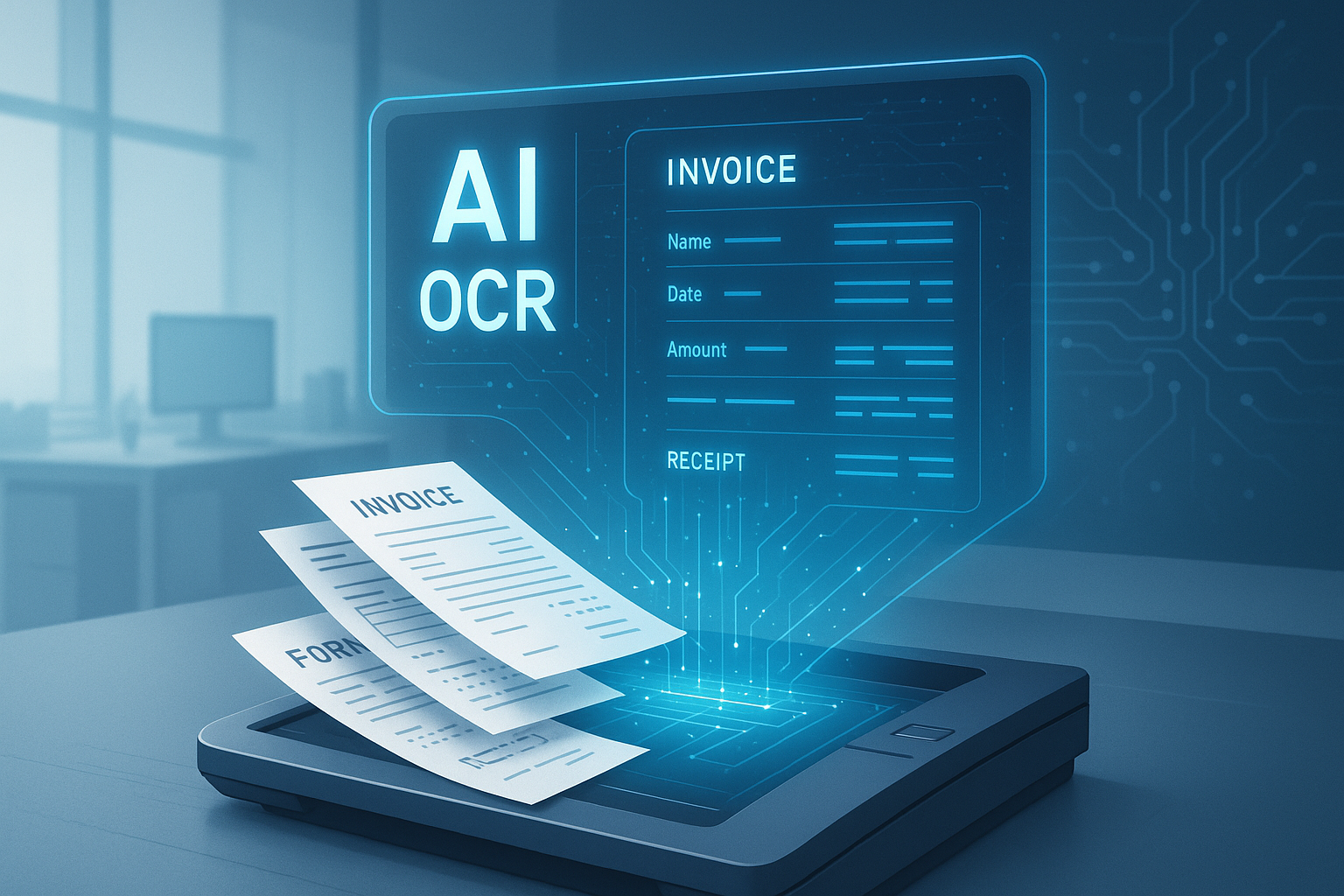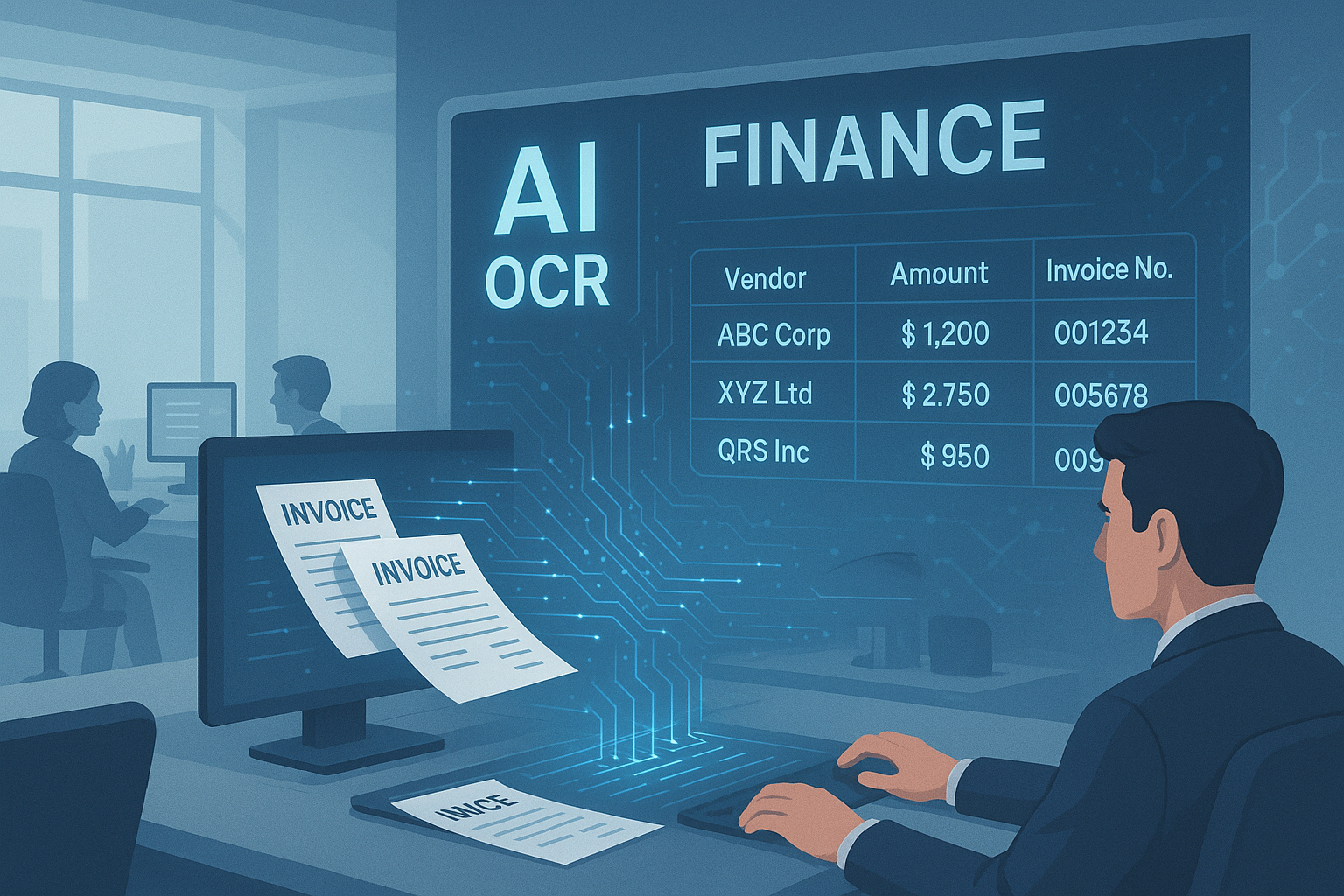Intelligent Document Processing: The Future of Automated Data Extraction
Discover how intelligent document processing is revolutionizing how businesses handle information extraction, streamlining workflows, and reducing manual data entry errors.

Table of contents
Intelligent Document Processing: Transforming Business Document Management
In today's data-driven business environment, organizations are drowning in documents. From invoices and purchase orders to contracts and customer forms, the sheer volume of paperwork continues to grow exponentially. This document overload creates significant challenges for businesses trying to operate efficiently while extracting valuable insights from their information assets.
Enter intelligent document processing (IDP) – a revolutionary approach that combines artificial intelligence, machine learning, and advanced OCR document processing to automate the extraction, understanding, and integration of data from various document types.
What Is Intelligent Document Processing?
Intelligent document processing refers to the use of advanced technologies to automatically extract, classify, and validate data from documents, then transform it into actionable information that can be integrated into business processes and systems.
Unlike traditional document management systems that simply store and retrieve files, IDP solutions actually understand document content, regardless of format or structure. This capability allows organizations to process both structured forms (like standardized applications) and unstructured documents (like emails or handwritten notes) with minimal human intervention.
How Intelligent Document Processing Works
The IDP process typically follows these key steps:
- Document ingestion: Capturing documents from multiple sources including scanners, emails, mobile devices, and digital repositories.
- Pre-processing: Enhancing document quality through image correction, noise reduction, and format standardization.
- Classification: Automatically identifying document types based on visual and content characteristics.
- Data extraction: Using OCR document processing software and AI to identify and extract relevant information.
- Validation: Verifying extracted data against business rules and existing databases.
- Export: Delivering processed information to downstream systems like ERP, CRM, or accounting platforms.
Core Technologies Powering IDP Solutions
Several advanced technologies work together to make intelligent document processing possible:
Optical Character Recognition (OCR)
OCR document processing forms the foundation of IDP by converting printed or handwritten text into machine-readable data. Modern OCR engines can recognize multiple languages, various fonts, and even degraded text with remarkable accuracy.
Machine Learning and AI
AI algorithms enable IDP systems to learn from experience, improving recognition accuracy over time. These systems can identify patterns, understand context, and make intelligent decisions about ambiguous data points.
Natural Language Processing (NLP)
NLP capabilities allow IDP solutions to understand the meaning and context of extracted text, not just recognize characters. This enables the system to interpret complex documents like contracts or medical records.
Computer Vision
Advanced image processing techniques help IDP systems understand document structure, identify tables, recognize logos, and process visual elements beyond just text.
Benefits of Implementing Intelligent Document Processing
Dramatic Time Savings
Manual document processing is notoriously time-consuming. IDP can reduce processing times from hours or days to mere minutes or seconds. For example, invoice processing that might take 15-20 minutes per document manually can be completed in seconds with an IDP solution.
Reduced Error Rates
Human data entry typically has an error rate of 1-4%. IDP systems can reduce this to less than 1%, leading to fewer downstream issues and rework.
Cost Efficiency
By automating routine document processing tasks, organizations can reallocate staff to higher-value activities. The ROI of IDP implementations often exceeds 200% within the first year.
Enhanced Compliance
IDP systems create detailed audit trails and ensure consistent application of business rules, reducing compliance risks in regulated industries.
Improved Customer Experience
Faster document processing means quicker response times for customers. Whether processing loan applications or insurance claims, IDP helps organizations deliver better service.
Real-World Applications of Intelligent Document Processing
Finance and Accounting
IDP excels at processing invoices, purchase orders, receipts, and financial statements. By automating accounts payable and receivable workflows, finance departments can process more transactions with fewer resources while capturing early payment discounts.
Healthcare
Medical records, insurance claims, and patient forms contain critical information that must be processed accurately. IDP solutions help healthcare providers extract and validate this data while maintaining HIPAA compliance.
Legal Services
Law firms and legal departments use IDP to process contracts, court documents, and case files. This technology enables faster document review and more comprehensive legal research.
Human Resources
From job applications to employee onboarding documents, HR departments handle extensive paperwork. IDP streamlines these processes, allowing HR professionals to focus on people rather than paperwork.
Choosing the Right IDP Solution for Your Business
When evaluating intelligent document processing options, consider these key factors:
- Document types: Ensure the solution handles your specific document formats and complexities.
- Integration capabilities: The IDP system should connect seamlessly with your existing business applications.
- Scalability: As document volumes grow, your IDP solution should scale accordingly without performance degradation.
- Accuracy rates: Look for solutions with proven high accuracy for your specific document types.
- Implementation timeline: Some solutions require extensive training periods, while others offer pre-trained models for faster deployment.
The Future of Intelligent Document Processing
IDP technology continues to evolve rapidly. Emerging trends include:
- Integration with robotic process automation (RPA) for end-to-end process automation
- Enhanced mobile capture capabilities for field workers
- Advanced analytics to derive business insights from processed documents
- Blockchain integration for document verification and secure sharing
Conclusion
Intelligent document processing represents a significant leap forward from traditional document management and basic OCR solutions. By combining AI, machine learning, and advanced data extraction OCR technologies, IDP enables organizations to transform their document-heavy processes into streamlined, efficient workflows.
As businesses continue to face growing document volumes and increasing pressure to operate efficiently, intelligent document processing will become not just an advantage but a necessity for competitive operations. Organizations that embrace this technology now will position themselves for greater agility, reduced costs, and improved customer experiences in an increasingly digital business landscape.
Related Blog Posts

Revolutionizing Document Management with OCR Technology
Explore how AI-powered OCR technology transforms document management by digitizing text, streamlining workflows, reducing errors, and boosting efficiency across industries.

Smarter Invoice Processing: The OCR Advantage for Finance Departments
Learn how OCR technology revolutionizes invoice processing for finance departments by automating data extraction from invoices, reducing costs, and boosting accuracy. This guide covers OCR's benefits, AI enhancements, and practical steps to transform accounts payable operations

OCR APIs: The Secret Weapon Smart Finance Teams Are Using Right Now
Discover how OCR APIs transform finance teams by automating data entry from receipts and invoices, cutting processing time by up to 85%, and boosting accuracy to 98%. This guide shares real-world insights for modernizing financial workflows.
Ready to Transform Your Lending Process?
See how DocsAPI's AI-powered industry classification can help you process loans faster, improve accuracy, and scale your operations.
